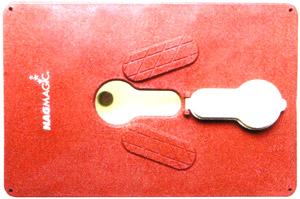SQUATTING PLATE self-supporting, 80x120cm
Valid Article
SQUATTING SLAB self-supporting, 80x120cm
Definition
Plastic squatting slab, with drop-hole cover, intended for emergency latrines.
Specifications
- One-piece moulded slab
- Plastic resistant to ultraviolet (UV) and infrared radiation (IR), urine, faeces and chemical products
- Smooth surface, easy to clean
- Self-supporting (does not need additional reinforcement)
- Cover attached with a strong hinge
- 1 hole in each corner (diameter 10 mm) for securing the squatting slab into the soil with pegs (supplied)
- Direct drop
- Size: 5 x 80 x 120 cm
- Weight: 11 kg
- Maximum load: 200 kg
- Stackable: 1 pile (40 units max.) on 1 Euro pallet (80 x 120 cm)
Instructions for use
These squatting slabs enable the rapid construction of latrines for health centres and communities.
The sides of the slab must be flush with the ground, with no gap, allowing the slab to seal the pit completely when positioned on the ground.
Test the installation before allowing people to use it.
Check the quality of the installation at regular intervals.
It is possible to transform the squatting slab with direct drop into a pour-flush latrine by attaching a plastic pan under the slab (to be ordered separately: see "Related Articles" below).
This can be useful in contexts where cultural resistance to direct drop is to be expected AND where the installation of a pour-flush latrine is technically possible (water must be available, the latrine must be able to drain into a reinforced pit (underneath the slab), or it must be feasible to connect a pipe to allow drainage into a tank or a sewer system).


![[CWATTOILS2P] (self-supporting squatting slab) PAN](/web/image/product.template/546178/image_256/%5BCWATTOILS2P%5D%20%28self-supporting%20squatting%20slab%29%20PAN?unique=32594a9)
![[CWATTOILS8-] SQUATTING PLATE, moulded plastic, 59x79cm + cover](/web/image/product.template/546174/image_256/%5BCWATTOILS8-%5D%20SQUATTING%20PLATE%2C%20moulded%20plastic%2C%2059x79cm%20%2B%20cover?unique=32594a9)
![[KMEDMEBO04A] (module VHF isolation) LOGISTIC AND SANITATION](/web/image/product.template/571742/image_256/%5BKMEDMEBO04A%5D%20%28module%20VHF%20isolation%29%20LOGISTIC%20AND%20SANITATION?unique=e4e4006)